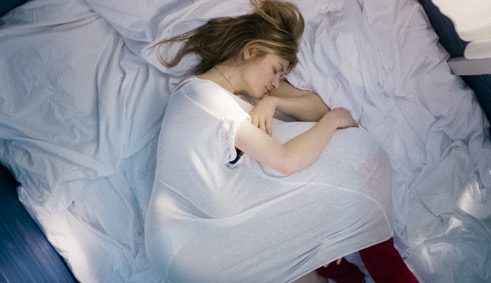Germany might have had only one film in competition in Berlin this year, but that one got it right. The heat is on for Anne Zohra Berrached as one of the big new hopes of German arthouse cinema.
Protagonist Astrid is a successful TV standup comedian, doing a shtick about her pregnancy. The first few scenes establish a loving, supportive, playfully happy and carefree private world. The drop height is high. The sudden unfairness of the baby’s Down syndrome diagnosis hits like a sledge hammer.
THE WORLD STOPS
The doctor’s staff talk pancake recipes while the couple’s world stops. We don’t hear the bad news, we only see the processing on the parents’ faces. The couple carries on, they fall back on their shared sense of humour, discussing the political correctness around derogative names for disabled children and finish with every parent's question: “I wonder what he’ll look like”, says the father. “He will look like you. But with Down”, says the mother.
Their environment's reaction ranges from a shocked “Oh fuck” to a desperate "Perhaps it's a chance." But as the fortune cookie on the table reads: “The strong are stronger than their bitter losses,” the parents announce they will have their son. The overwhelmed babysitter quits with the words “That’s gross!” We are getting nervous when the doctor is getting nervous at the next exam. The silent news of a severe heart defect remains off camera. “What can we do?” “Nothing. You have to respect the power of nature, it's a matter of fate,” is the cruel but necessary truth.
A FILM THAT DOESN’T JUDGE
A myriad of simple but tough questions beautifully permeate the film and Astrid and Markus‘ painful decision-making process around the question of a potential late-term abortion: How can you be the mother you want to be? Can I handle it? There are no answers to be had. Every protagonist is stunned and troubled in their own way. Legally, the final big decision in the room, of abortion after the 24th week, when an embryo is viable, is not based on the child’s diagnosis but the mother’s physical and mental capacity for dealing with a severely disabled child.
You can tell that the filmmaker burns for her film and the topic. The surprising statistic that triggered the project, director Anne Zohra Berrached reports: 90 percent of women in Germany facing this news choose a late-term abortion. The audience gets a sense of how much this arduous process after the diagnosis of a genetic glitch challenges one's personality, how much it rattles the cage of one's convictions and humanity. What we take away from this film —a film that doesn’t judge and doesn’t position itself beyond being pro-choice— is that you can't know others’ suffering (although the director Anne Zohra Berrached gets us startlingly close).
